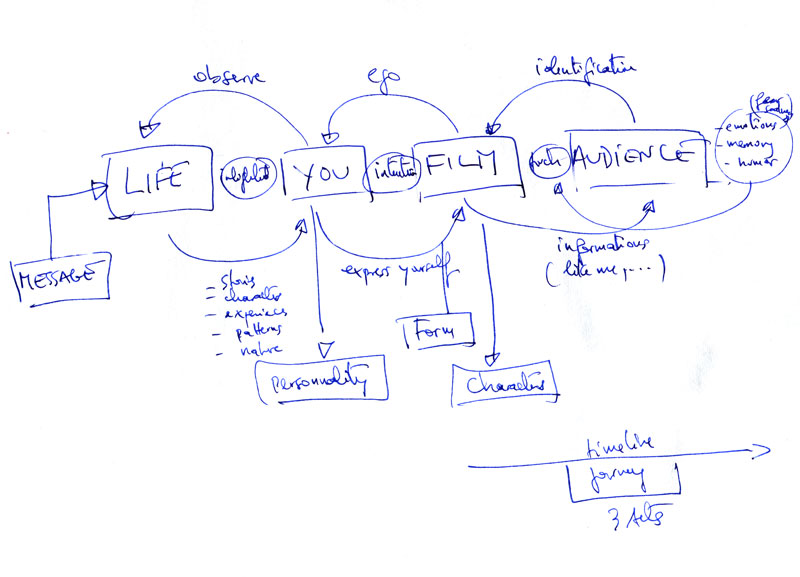Cameroon, , 2015
Jean-Pierre
Bekolo
Jean-Pierre Bekolo (b. 1966 in Yaoundé) is considered one of Cameroon’s most famous filmmakers. In the press he is often called an “Afro-Futurist” – or, in other words, someone striving to re-invent his continent. The director, who teaches in Cameroon, France, and the USA, has collected many international prizes over the years. His films show a stubborn refusal to conform to Western expectations for African cinema by the way he mixes genres and connects pop culture with politics. No one has dared to show his film Le Président (2013) in Cameroon, not even the Institut Français. It was shown at Kino Arsenal in Berlin in 2013.
Bekolo’s debut film Quartier Mozart (1992) won an award at the festival in Cannes, and thereafter garnered many awards from Locarno to Montréal. He created his second film Le complot d’Aristotle (1996) for the British Film Institute to commemorate the hundredth anniversary of cinema. Scorsese, Godard, and Bertolucci also contributed films to the centennial. In 2005, Bekolo’s film Les saignantes (2005) premiered at the film festival in Toronto, came in second place at the Pan-African Festival in Burkina Faso, and won an award for best actress in a leading role. Bekolo’s video installation An African Woman in Space was shown in 2008 at the Musée du Quai Branly in Paris. His book Africa for the Future was published in 2009 by Editions Dagan in Paris. He recently completed his manuscript for Cinéma & Action en Afrique which is, in the words of the newspaper Welt, “a document of anger about conditions in Africa,” but also “a document of hope which strives to make a difference with the film.”
The controversy surrounded Bekolo’s last film Le Président (2013) came to a head with the kidnapping and torture of a young filmmaker, who had dealt with the same topic in 2009. The issue: Bekolo touches a sensitive taboo by showing an old man clinging to power, just like Paul Biya, the real president of Cameroon, who has been in office for over thirty years. The film was screened in public just once in Cameroon. The director explains, “You need to understand that the president of Cameroon is the be all and end all, the embodiment of power, and has been for over thirty years.” Even the filmmaker himself was surprised at how his fictional film could touch a nerve even more than a collection of facts. “I hadn’t realized how my parable harks back to an old African narrative tradition endowing signs and symbols with extraordinary power.” The mockumentary recounts a mythic state of emergency in Cameroon when the aged omnipotent government ruler disappears right before elections. Le Président depicts a man plagued by desperation; no longer understanding what is happening around him, he is forced by kidnappers to answer his constituents’ questions.
He is not the only one careening toward the end, but the entire country, leaving a trail of accusations, mourning, and missteps in its wake. The sounds shift dramatically in Bekolo’s film, ranging from incessant beats to a rap video, before sampling a television show, while split screens distort the perspective. A seemingly blind old man turns away from the scene in a poetic-surreal way, then the real dust of an everyday Cameroon street enters again the scene. Le Président tells a story of defeat with a light-footed dose of humor.
In Les Saignantes (2005), Bekolo eagerly does away with the so-called law of reality: the film, an erotic thriller-cum-science fiction movie with political overtones, is set in Cameroon in the year 2025. The film portrays two women who win the sexual favor of the political elite. Suddenly, one of the politicians dies during sex and the women need to get rid of the body. Bekolo’s intertitles and jump-cuts allude to Godard’s influence, albeit with a touch of irony.
Bekolo calls his film Le Complot d‘Aristotle’ (1995), which was created as a commission for the BFI, a “balls-to-the-walls meditation on the meaning and purpose of ‘African’ film.” According to the critic Michael Dembrow, in order to understand the film the viewer needs to watch and listen to the movie very carefully, paying particular attention to the director’s voiceover: “And just as we are trying to piece together all of the movie’s individual pieces, the plot begins to revolve around itself, scenes are repeated, characters maneuver like the chess pieces and symbols that they portray.”
In his debut film Quartier Mozart (1992), he transforms a well-known folktale into a casual commentary on gender roles. The adventure starts when a schoolgirl is turned into a man by the magician Mama Thekla. Every man who shakes Thekla’s hand loses his penis. With humor, a hip-hop soundtrack, and a twinkle in his eye, Bekolo offers up a story full of intelligence, wit, and provocation.
Text: Maike Wetzel
Translation: Amy Pradell
2013 Le Président (feature film, HD video, 72’)
2005 Les Saignantes (feature film, HD video, 92‘)
1996 Le Complot d‘Aristotle (short film, HD video, 72’)
1992 Quartier Mozart (feature film, HD video, 80‘)



